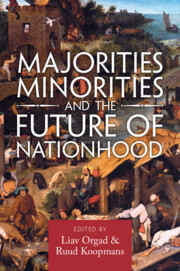
-
Select format
-
- Publisher:
- Cambridge University Press
- Publication date:
- November 2022
- November 2022
- ISBN:
- 9781009233378
- 9781009233347
- 9781009233354
- Dimensions:
- (229 x 152 mm)
- Weight & Pages:
- 0.64kg, 338 Pages
- Dimensions:
- (229 x 152 mm)
- Weight & Pages:
- 0.5kg, 338 Pages
- Subjects:
- Political Theory, Sociology of Race and Ethnicity, Politics and International Relations, Sociology
You may already have access via personal or institutional login- Subjects:
- Political Theory, Sociology of Race and Ethnicity, Politics and International Relations, Sociology
Book description
The design of democratic institutions includes a variety of barriers to protect against the tyranny of the majority, including international human rights, cultural minority rights, and multiculturalism. In the twenty-first century, majorities have re-asserted themselves, sometimes reasonably, referring to social cohesion and national identity, at other times in the form of populist movements challenging core foundations of liberal democracy. This volume intervenes in this debate by examining the legitimacy of conflicting majority and minority claims. Are majorities a legal concept, holding rights and subject to limitations? How can we define a sense of nationhood that brings groups together rather than tears them apart? In this volume, world-leading experts are brought together for the first time to debate the rights of both majorities and minorities. The outcome is a fascinating exchange on one of the greatest challenges facing liberal democracies today.
Contents
Metrics
Altmetric attention score
Full text views
Full text views help Loading metrics...
Loading metrics...
* Views captured on Cambridge Core between #date#. This data will be updated every 24 hours.
Usage data cannot currently be displayed.
Accessibility standard: Unknown
Why this information is here
This section outlines the accessibility features of this content - including support for screen readers, full keyboard navigation and high-contrast display options. This may not be relevant for you.
Accessibility Information
Accessibility compliance for the PDF of this book is currently unknown and may be updated in the future.


